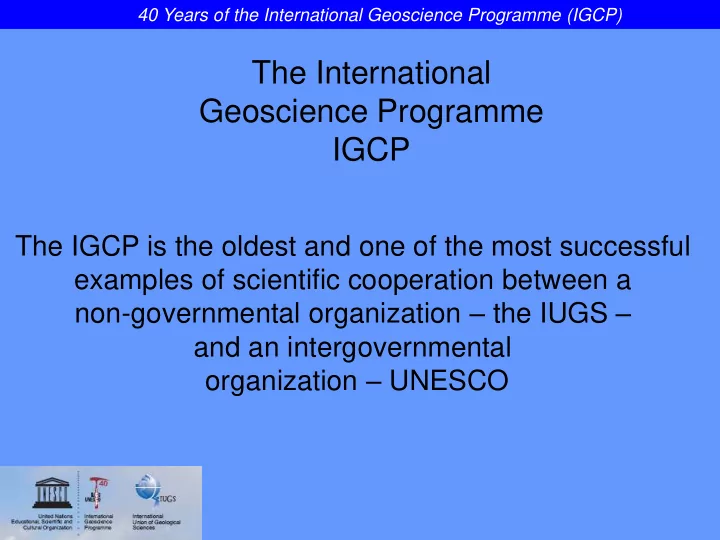

40 Years of the International Geoscience Programme (IGCP) The International Geoscience Programme IGCP The IGCP is the oldest and one of the most successful examples of scientific cooperation between a non-governmental organization – the IUGS – and an intergovernmental organization – UNESCO
40 Years of the International Geoscience Programme (IGCP) Catastrophic events in Earths´ History Vivi Vajda, Professor in Paleontology, Lund University, Sweden. IGCP Chair 2009-2012
70 million year old dinosaur footprints in Bolivia
40 Years of the International Geoscience Programme (IGCP) The thought of IGCP started out in late 1960s as a need to correlate (=link) the continents Note that the theory on continental drift was not yet accepted!
Distribution of the Plant fossil Glossopteris : one of the first firm evidences for existence of Gondwana Modern distribution of Glossopteris fossils ? ? ?
1911-1913 BRITISH SOUTH POLAR EXPEDITION Oates Scott Evans Bowers Wilson
40 Years of the International Geoscience Programme (IGCP) School book example is Grand Canyon
40 Years of the International Geoscience Programme (IGCP) There were evident needs to aid interaction and exchange of ideas between scientists in the East-West divided Europe of that time, and scientist in Asia- where many countries were involved in wars The programme was launched in 1972 during the 24th International Geological Congress in Montreal as a joint Initiative of IUGS and UNESCO
40 Years of the International Geoscience Programme (IGCP) The first IGCP Scientific board, 1973 First IGCP Scientific Board Chairman Sir Kingsley Dunham, late Director of the British Geological Survey
40 Years of the International Geoscience Programme (IGCP) From Correlation Programme Original primary aims - stratigraphy To a Geoscience programme IGCP brings together scientists from around the world, and provides them with seed money to devise and conduct joint international research and to collectively publish the results. High on the list of selection criteria are scientific quality and the extent of the international, multidisciplinary cooperation likely to begenerated by a proposed project.
40 Years of the International Geoscience Programme (IGCP) Changes in IGCP Geoscience in the Service of Society Edward Derbyshire IGCP Chair 1996-2001 Professor, Royal Holloway, University of London Editor: Edward Derbyshire
40 Years of the International Geoscience Programme (IGCP) IGCP has during the 40 years supported over 500 projects in about 150 countries
40 Years of the International Geoscience Programme (IGCP) Presently about 30 projects running covering over 5 themes Still keeping the important “bottom - up” approach
40 Years of the International Geoscience Programme (IGCP) Themes: • The Global Change and Evolution of Life • Geohazards: reducing risks • Earth Resources: sustaining society • Geoscience of the Water Cycle • The Deep Earth: how it controls our environment
40 Years of the International Geoscience Programme (IGCP) Which are the main sponsors? • The initiators and main sponsors of the IGCP are IUGS and UNESCO’s Division of Ecological and Earth Sciences • Other sponsors include UNESCO’s Water Sciences Division, The Swedish International Development cooperation Agency (SIDA) and the National IGCP- committee of China
40 Years of the International Geoscience Programme (IGCP) Some of the conditions for winning an IGCP project are: • Involvement of scientists from the developing countries • Capacity building programs (i.e. MSc, PhD) within the project • Conferences and Training Workshops conducted in both the developing and developed countries • Sharing of research facilities for producing high-quality data • Joint publications of journal papers, maps, models
40 Years of the International Geoscience Programme (IGCP) Ear-marked funding from SIDA, 100.000 USD/year during 5 years Ear-marked funding supporting scientists from selected developing countries. help to integrate “new” project leaders in at least six excellent projects with the aim to integrate these new leaders into the whole working process of applications, annual reporting, organization of workshops, participation in business meetings etc. The main point is that the infrastructure is already set up including networks of experienced international scientists used to running IGCP projects
IGCP- integrating nations, Cultures and Science
Recommend
More recommend